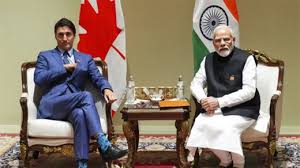Complicit : On India and the U.S and Canada cases
India must come clean on its stance on transnational killings
The U.S. Department of Justice’s second indictment against an Indian intelligence and paramilitary officer, in the alleged plot to kill American-Khalistani activist Gurpatwant Singh Pannun, indicates another serious turn in the case that has cast a long shadow over India-U.S. ties. The indictment against Vikash Yadav was released publicly along with an arrest warrant and his listing on the FBI’s database of “most wanted” — the first time that an Indian official has been so marked out. The developments come just after a high-level Indian security delegation investigating the matter travelled to the U.S., and the U.S. State Department expressed “satisfaction” with India’s cooperation. There is cause for concern now: the second indictment that supersedes the one against jailed businessman Nikhil Gupta, repeats linkages to the Canadian case of the 2023 killing of Canadian-Khalistani activist Hardeep Nijjar. It seems no coincidence that the indictment is timed with the Canadian expulsion of Indian diplomats, sparking a diplomatic storm and also statements by the “ Five Eyes ” urging India to cooperate in the investigation with Canada. That these statements reek of a double standard, given that these countries have a record on transnational killings, must not stop India from upholding the law. But this surely raises questions about whether these allies are reliable as India’s closest strategic partners.
New Delhi must not delude itself and must proceed on the assumption that the cases in the U.S. and Canada are being linked by their investigating agencies. The stark difference in the Modi government’s outraged denial of the Canadian charges while providing a sympathetic ear for the American charges may prove untenable as the trial in the U.S. progresses. It is in India’s interest to clarify whether it believes Mr. Yadav was a “rogue” agent or was carrying out orders from senior officials, when he allegedly promised “2-3” contract killings a month against targeted members of the diaspora. While the External Affairs Ministry has since confirmed that he “no longer works for the government”, the indictment claims that he was employed by India’s Cabinet Secretariat, under which the R&AW is run. Whether the truth lies in incompetence or complicity, the image of the government’s intelligence and national security operations is dimmed. If the government proceeds to prosecute him or turn him over to U.S. agencies, it must also consider the impact on the morale of other operatives essaying future operations. Above all, the government must be more transparent about its policy on transnational killings. If it does not allow such operations, and it should not, then it is time for a more detailed investigation into its internal processes as well as a more realistic evaluation of its diplomatic relations.
